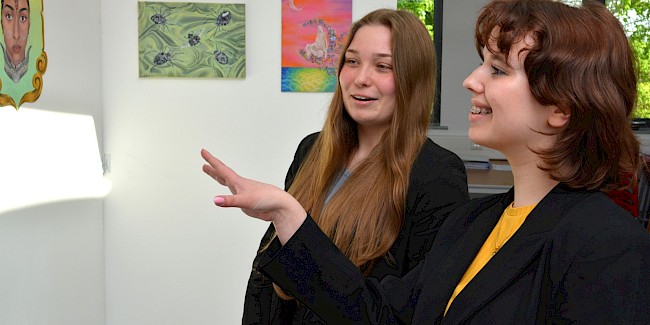Assessment at IB:
As the Theory of Knowledge is essentially a meta-tool used to analyse all subjects on the IB, the emphasis is very much on skills gained and not on content. There is therefore no examination.
In order to test Theory of Knowledge skills, students complete two coursework pieces, one in each year.
Year 12: TOK Exhibition – weighting 33% (1/3)
The exhibition is an opportunity for students to demonstrate a personal response to a knowledge prompt, using three real-life objects that are particularly pertinent to their own understanding of knowledge. The objects can range from a sculpture they have produced, to a film they have watched, to a cultural artefact that is personal to them.
For example, to the knowledge prompt, “What challenges are raised by the dissemination and/or communication of knowledge?”, three objects that could be used to answer this are:
- a jumper that a student has knitted, with some errors in, showing how communication can sometimes be limited or disrupted;
- a re-tweet on Twitter the student has been sent about school opening for year 12 after the Coronova virus lockdown, demonstrating a multiplicity of different views about an issue;
- an abstract painting the student has created in an art class, showing how the author’s intention can be interpreted in many different ways.
Students will been given time and guidance to plan this exhibition, and then to write up how each object links to the knowledge prompt that they have chosen. A draft will be commented on by their teacher, before the final write up of 950 words is submitted.
Year 13: TOK essay – weighting 67% (2/3)
The essay allows students to demonstrate the Theory of Knowledge skills they have accumulated during the two years of the course, in an 1600-word essay, responding to one of 6 titles prescribed each year by the IB. Some of the previous titles have ranged from “Present knowledge is wholly dependent on past knowledge.” Discuss this claim with reference to two areas of knowledge” to “Context is everything” Discuss this claim with reference to two areas of knowledge.”
Students will be given time and guidance to plan the essay and will then submit a draft, which will be commented on by their teacher, before submitting the final version of no more than 1600 words.
Further Reading/Resources
Documentaries about TOK issues:
https://www.khanacademy.org/partner-content/wi-phi/wiphi-metaphysics-epistemology/wiphi-theory-of-knowledge/v/introduction-theory-of-knowledge
https://sites.google.com/a/seisen.com/tok/the-problem-of-knowledge-1
Films that raise TOK issues:
- Good Will Hunting – the difference between academic and experiential knowledge
- The Matrix – the nature of reality
- The Adjustment Bureau – are our lives already planned or can we change them?
- An Inconvenient Truth – climate change
- Inception – the place of the imagination in gaining knowledge
British Values:
British Values in TOK
Democracy: Role of authorities and politicians in dissemination knowledge to the public
Rule of law: Purposes and value of education for providing knowledge
Individual liberty: Individual knowledge vs shared knowledge; uses of social media
Mutual respect: Comparing and discussing methodologies in different subjects; Sharing of own cultural experiences and knowledge
Tolerance of others’ faith and beliefs: Faith as a way of knowing; Exploration of individual paradigms and ways of shaping knowledge; Perspectives is one of the key aspects of the knowledge framework
